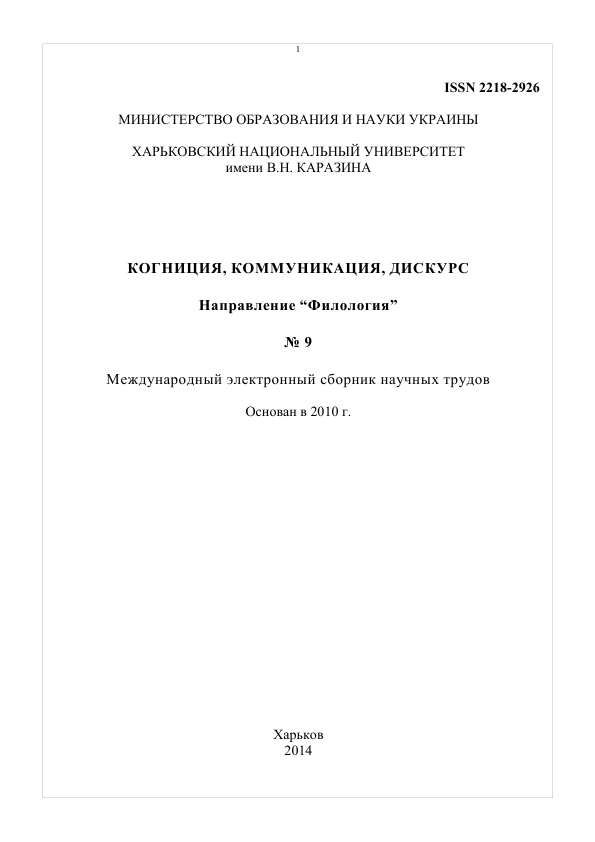Комунікативні стратегії міжнародних ділових переговорів в аспекті синергетики
Анотація
Мета статті – теоретичне обрунтування доцільності вікористання синергетичного підходу до вивчення мовленнєвої діяльності. Такий підхід базується на принципі самоорганізації складних комунікативних систем та їх взаємодії із екстралінгвістичним середовищем. Подібні системи, відомі в синергетиці як «дисипативні» або «вкладені» (Пригожин 1991), характеризуються складною внутрішньосистемною взаємодією компонентів та інтегрованістю в якості підсистеми в систему вищого порядку. Показано, что в процесі интеграційної взаємодії підсистем має місце їх взаємна акомодація, тобто встановлення рівноваги між автономією кожної з підсистем та їх взаємозалежністю. Стверджується, що принцип взаємної адаптації діє також і в сфері людської, в тому числі, міжкультурної комунікації. Як приклад комунікативної системи, що самоорганізується, наводиться сфера міжнародних ділових переговорів. Як теоретико-методологічна база для її опису пропонується теорія комунікативної адаптації.
Завантаження
Посилання
Cai, D.A., Drake, L.E. (2001). The business of business negotiation: intercultural perspectives. Communication Yearbook, 21, 15-31.
Chomsky, N. (1965). Aspects of a Theory of Syntax. Cambridge MA: MIT Press
Drake, L.E. (1995). Negotiation styles in intercultural communication. International Journal of Conflict Management, vol. 6, 1, 72-90
Fayerweather, J., Kapoor, A. (1976). Strategy and negotiations for the international corporation. The International Executive, v.18, Issue 2, 20-22
Fransis, J.N.P. (1991). When in Rome? The effects of cultural adaptation on international business negotiations. Journal of International Business Studies, 22, 403-428
Gallois, C., Giles, H., Jones, E., Cargile, A., & Ota, H. (1995). R. Wiseman (ed.). Accommodating intercultural encounters: Elaborations and Extentions. Thousand Oaks, CA: Sage.
Giles, H., & Powesland, P. (1975). Speech Style and Social Evaluation. London: Academic Press
Giles, H., Coupland, N., & Coupland, J. (1991). Accommodation theory: Communication, context and consequences. In: Contexts of Accommodation. Cambridge, UK: CUP, pp. 1-68
Gudykunst, W.B. (1997). Cultural variability in communication. Communication Research, 24, 327-348.
Haken, G. (1991). Informatsiya i samoorganizatsiya [Information and self-organization]. Moscow: MIR Publ.
Hawes, L. (1999). The dialogics of conversation: Power, control, vulnerability. Communication Theory, 9, 229-264.
Hofstede, G. (1980). Culture’s Consequences: International Differences in Work-related Values. Beverly Hills, CA: Sage.
Hui, C.H. (1980). Measurements of individualism-collectivism. Journal of Cross-Cultural Psychology, 17, 225-248
Jones, E., Gallois, C., Barker, M. (1999). Strategies of accommodation: development of a coding system for conversational interaction. Journal of Language and Social Psychology, June, 123-151.
Prigogine, I., Stengers, I. (1987). Order out of chaos: man's new dialogue with nature. Toronto, New York, NY: Bantam Books.
Prigogine, I.G. (1991). Priroda i novaya ratsionalnost’ [Nature and a new rationality]. Filosofiya i zhyzn – Philosophy and Life, 75-23 (in Russian)
Putman, L.L., Wilson, S.R. (1989). Argumentation and bargaining strategies as discriminators of intergrative outcomes. In: Managing Conflict: An Interdisciplinary Approach. New York: Praeger, pp. 121-141
Rezhabek, E.Ya. (2009). Synergeticheskoye predstavleniye o sotsialnoy realnosti [A synergistic idea of social reality] In: Synergeticheskaya paradigma. Sotsialnaya synergetika [The synergistic paradigm. Social synergistics]. Moscow, 218 p.
Schegloff, E.A. (1991). Conversation analysis and socially shared cognition. In: Resnick, L.B., Levine, J.L. & Teasley, S.D. (eds.). Perspectives on Socially Shared Cognition, pp. 150-170
Schwartz, B.D. (1993). On explicit and negative data effecting and affecting competence and linguistic behavior. Studies in Second Language Acquisition ,15.2, 147-63.
Taylor, J.R. (2001). The “rational“ organization reconsidered: an exploration of some of the organizational implications of self-organizing. Communication Theory, 11/2, May, 137-177.
Thompson, L., Hastie, R. (1990). Social Perception in Negotiation. Organizational Behavior and Human Decision Processes, 47(1), 98-123.
Ting-Toomey, S. (1988). Conflict styles in black and white subjective cultures. In: Kim, Y. (ed.). Current Research in Interethnic Communication. Beverly Hills, CA: Sage, pp. 75-89
Triandis, H.C. (1987). Collectivism vs. individualism: a reconceptualization of a basic concept in cross-cultural social psychology. In: Verma, G.K. & Bagley, C. (eds.). Cross-Cultural Studies of Personality, Attitudes, and Cognition. New York: St. Martin’s Press, pp. 12-35
Walker, G.B. (1990). Cultural orientation of argument in international disputes: negotiating the Law of the Sea. In: Korzenny, F. & Ting-Toomey, S. (eds.). Communicating for Peace: Diplomacy and Negotiation. Newbury Park, CA: Sage, pp. 43-60
Weiss, St. E. (1994). Negotiating with "Romans"- Part 2. Sloan Management Review, 116-201.
White, C.H., Burgoon, J.K. (2001). Adaptation of communicative design: patterns of interaction in truthful and deceptive conversations. Human Communication Research, v. 27, 1, 9-37.
Автори, які публікуються у цьому журналі, погоджуються з наступними умовами:
Автори залишають за собою право на авторство своєї роботи та передають журналу право першої публікації цієї роботи на умовах ліцензії Creative Commons Attribution License (CC BY), яка дозволяє іншим особам вільно розповсюджувати опубліковану роботу з обов'язковим посиланням на авторів оригінальної роботи та першу публікацію роботи у цьому журналі.
Автори мають право укладати самостійні додаткові угоди щодо неексклюзивного розповсюдження роботи у тому вигляді, в якому вона була опублікована цим журналом (наприклад, розміщувати роботу в електронному сховищі установи або публікувати у складі монографії), за умови збереження посилання на першу публікацію роботи у цьому журналі.
Політика журналу дозволяє і заохочує розміщення авторами в мережі Інтернет (наприклад, у сховищах установ або на особистих веб-сайтах) рукопису роботи, як до подання цього рукопису до редакції, так і під час його редакційного опрацювання, оскільки це сприяє виникненню продуктивної наукової дискусії та позитивно позначається на оперативності та динаміці цитування опублікованої роботи (див. The Effect of Open Access).




